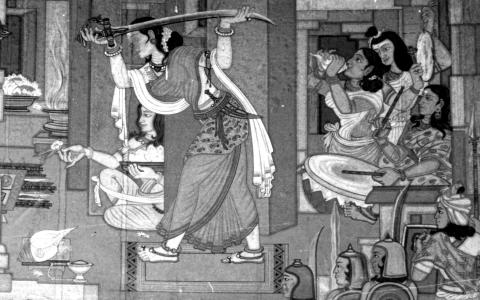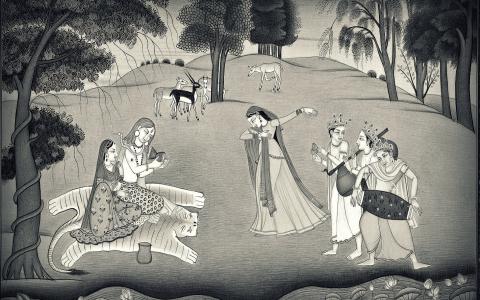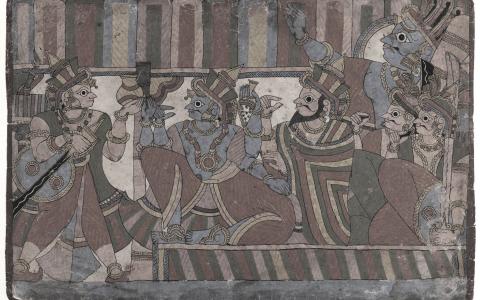September 2016

An important concept that Krishna speaks about in the Gita is that of being a स्थितप्रज्ञ – a balanced person with steady intellect. He says, “One who abandons selfish desires and is satisfied within the true self is a sthitaprajna (BG 2.55). In other words, he is telling Arjuna to let go of देहाभिमान, the obsession with the body and focusing only on the material aspect of living.
Krishna has been a sthitaprajna all his life. He has...

अशेषशेमुषीमोषं माषानश्नामि मातुल ।बिम्बवल्लीवितानाधः पिबामि दधि माहिषम् ॥
There is an apocryphal tale about Sriharsha. It says that he appeased Vindhya-vasini-devi and gained exceptional scholarship. Armed with this, he set out to write treatises on various shastras, and even tried his hand at poetry. But things turned out in such a way that every word he wrote became unintelligible to the people around him. Even the most learned of men could...

There are many references to show that women too were endowed with the spirit of kshaatra. For instance, in the Ramayana, we have the Kaikeyi episode. When Dasharatha took part in the great war between devas and asuras, Kaikeyi accompanied him. It is during that war she obtained those two boons from Dasharatha. In the Mahabharata, when Arjuna kidnaps Subhadra, a huge army of yadus attacks him. When he single-handedly combats the army, it is...

This is the full text of the author’s paper presented at the National Seminar of the Indian Council of Philosophical Research held in Bangalore in September 2016.
Ayurveda, like any other science, is not a finished product; it is an evolving medical tradition. Its evolution has been characterised, since inception, by two fundamental attributes – one, a natural alignment with the Vedic worldview of Sanatana-Dharma in matters relating to both...

What is happiness? It’s hard to define but we all know what it is. We have all experienced it. In fact, we experience it every day – when we eat our food, when we work on a project that we are passionate about, when we smile at someone on the street, when we spend time with a hobby, or when we sleep.
The Hungarian psychologist Mihály Csíkszentmihályi has spent many years studying what makes life worth living and what truly leads to happiness. In...

Chakravarti Rajagopalachari (1878-1972), popularly known as ‘Rajaji’ or ‘CR’ was a renowned advocate, statesman, writer, freedom fighter, journalist, and political leader. He was hailed as M K Gandhi’s conscience-keeper (somebody had to be, for better or for worse). A voracious reader, original thinker, astute politician, and prolific writer, Rajaji was a modern-day renaissance man. He was also a devout Hindu with a firm belief in the almighty...

Sangitaratna Chintalapalli Venkataraya was a tiger of the yesteryears. Though the usage of ‘tiger’ as a simile for a musician may be debated, the tiger is renowned for representing courage and fortitude. This was the prowess of Venkataraya. He belonged to the line of great vidvans of music. His training in tradition and the craft of music was of a high degree. When a person acquires learning by his own efforts, when the mind becomes filled with...

What can we do to stay healthy? Nothing much frankly, except for an easy adherence to a few simple rules. These rules relate to the four pillars of health namely, food, sleep, exercise and emotional wellness.
आहार-निद्रा-व्यायाम-ब्रह्मचर्यै: सुयोजितै:।
शरीरं धार्यते नित्यमागारमिव धारणै:।।
(राघवन् तिरुमुत्पाट्)
Food
"You are what you eat." Traditional, time-honored foods that are freshly prepared with locally available ingredients are the best...

In the Vedas, alternative words for kshatriya are ‘गोप,’ ‘पशुप,’ ‘शर्धा,’ ‘व्रात,’ etc. The word ‘गो’ has ten meanings of which one of them is ‘earth.’ Other meanings include ‘wealth,’ ‘knowledge,’ etc. It also has the meaning of one who nurtures all these. In several places, Indra has been called ‘गोपति.’ The word ‘गोप्ता’ comes from the root word ‘गुप्.’ When words like ‘गोप’ and ‘गोप्ता’ are used in the sense of nourishers and kshatriyas, it...

Krishna had the qualities of a good statesman – be it eloquence, integrity, intelligence, wit, or the ability to take quick decisions. One can imagine he was a soft-spoken person. He spoke words that were at once pleasant and honest (see BG 17.15). While his words were practical, they were never devious. He never forgot a promise, he never broke a promise. And yet, for the sake of dharma, he was willing to abandon a hundred promises....
